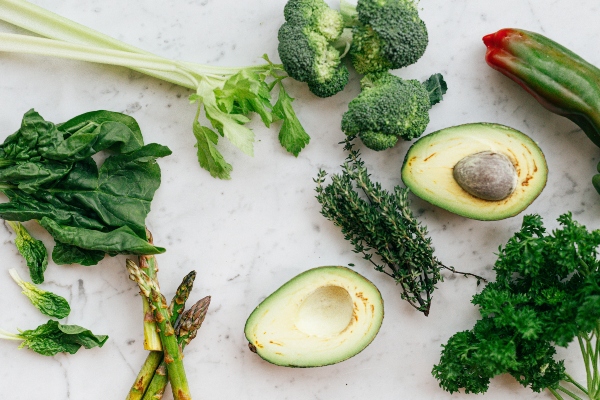Living Food Diet has Growing Following
by Kelly A. Goff
Imagine never turning on your stove or oven; your fridge bulging with vegetables and fruits; your pantry stocked with raw nuts and always taking an avocado with you for dinners out, just in case there’s nothing on the menu you can eat. That’s a peek into the world of a “raw foodist.” Such a diet is gaining traction on the Coasts, but in Atkins-friendly Texas, it can seem like a completely foreign concept.
Once reserved for hippies and health fanatics, raw food diets are starting to appeal to more of the mainstream as threats of disease and obesity rise. Telegenic actors like Demi Moore and Woody Harrelson, who have been known to follow raw food diets, have increased interest in the practice. Even high-profile chefs, such as Charlie Trotter in Chicago, offer raw food options in their restaurants.
The Raw Way
Raw foodists aren’t necessarily vegetarians, but the belief does dovetail with vegetarianism simply because living plants are much more accessible and easy to prepare than animal products. While an exact definition is hard to pinpoint, people who follow a raw and living food diet believe that raw foods have much higher nutrient values than cooked foods. Raw-food proponents contend that the process of cooking (at least anything above 118 degrees) destroys, or degrades, the digestive enzymes found in many foods. Generally food is considered raw if it has not been altered by any method that would change its basic chemical structure, such as cooking, freezing or the use of chemical preservatives.
Most foods in living food diets are simple in preparation and can be eaten immediately. These include fruit and salads. Other foods can require considerable advanced planning and preparation. Rice and some other grains, for example, require sprouting or overnight soaking to become edible.
Health Benefits
Most raw foodists believe that the greater the percentage of raw food in one’s diet, the greater the health benefits. Advocates claim that a decrease of raw foods in our diet has caused an increase in health problems, including asthma, allergies, cancer, diabetes, heart disease, learning disabilities, depression, candida, chronic fatigue, fibromyalgia and many other conditions.
David Wolfe, the author of Eating for Beauty and The Sunfood Diet Success System, stopped eating anything cooked or processed 11 years ago. Wolfe’s diet now consists largely of fruit smoothies, fresh vegetable juices and the occasional handful of pumpkin seeds. “Clear skin… clear thinking, improved digestion,” he says, ticking off the changes he noticed after making the switch. “People, after lunch these days, are still out to lunch. Their heads are not clear, and they have no energy because their bodies are working so hard to digest their food. I never experience that anymore. I’m supercharged with energy.”
One universally recognized effect of a high raw diet is weight loss. Many leading raw-diet proponents report being overweight on a conventional diet but achieving a desirable weight on a raw vegan diet. “This effect is no mystery, as raw plant foods are generally low calorie, high fiber foods that are very filling,” said Stephen Walsh, Ph.D., and contributor to the publication The Vegan.
Scientific research on the subject is scarce. However, a study published in the Journal of Nutrition last year indicates that consumption of a strict raw food diet lowers cholesterol and triglyceride levels. Many studies support a diet rich in fruits and vegetables as a way to decrease cancer and heart disease risk. Another study found that people who adhere to strictly raw vegetarian diets have many of the signs of strong bones. This contradicts studies that warn diets without dairy lead to the bone-thinning disease osteoporosis. “We think it’s possible these people don’t have increased risk of fracture but that their low bone mass is related to the fact that they are lighter because they take in fewer calories,” said Dr. Luigi Fontana, who led the study at the Washington University School of Medicine in St. Louis.
Health Risks
Doctors and dietitians worry that limiting food choices can lead to nutritional deficiencies over the long run. In addition to increasing the risk of developing osteoporosis, due to decreased calcium and vitamin D intake, a vitamin B12 deficiency is possible. This vitamin helps maintain healthy nerve cells and red blood cells. It is also needed to help make DNA. It’s bound to the protein in food and is found naturally in animal products, such as meat, fish, poultry, eggs and milk. Fortified cereals help vegetarians get this valuable vitamin, but because that’s considered processing, strict raw foodists don’t benefit and can suffer from anemia, fatigue, weakness, weight loss and neurological changes.
Doctors warn pregnant women, children and anyone with immune deficiencies in particular against following a raw-foods-only diet mainly because of the risks related to nutritional deficiencies.
Excessive weight loss is a common reason for abandoning raw food diets. Dr. Walsh notes that including sufficient tropical fruits such as bananas and avocados, or nuts and seeds and cold pressed oils, is important for maintaining a healthy weight once any desired weight loss has been achieved.
Hard Act to Follow
Even raw foodists admit that sticking to an exclusive raw-food diet can be difficult. Dr. Joel Fuhrman, a family physician in New Jersey and author of Eat to Live: The Revolutionary Formula for Fast and Sustained Weight Loss, who advocates a vegetable-based diet, thinks an all-raw diet is too restrictive. “I teach people the value of having lots of raw food, but not that you should be 100 percent raw,” he says. “Cooked food is not poisonous. It’s the diet most Americans eat now, with all those processed foods, that’s poisonous.”
While more nutrients are usually available in foods that aren’t heated or highly-processed, there are some nutrients that are actually better absorbed in food that’s been cooked. The best sources of the antioxidant lycopene, which has been shown to reduce the risk of prostate and lung cancer in studies, are cooked tomato products like spaghetti sauce and tomato paste. Similarly, the body’s ability to absorb beta carotene, another antioxidant that can protect against cancer and is found in carrots (among other sources), increases when the vegetable is cooked.
“The whole issue about heat sensitivity and destroying vitamins when you cook foods is more of a myth than people realize,” says Dr. Christine Gerbstadt, a doctor and registered dietitian in Pennsylvania and spokesperson for the American Dietetic Association.
She prefers the U.S. Department of Agriculture’s 2005 dietary guidelines instead. Fill half your plate with raw fruits and vegetables, she says, but split the other half between grains and a protein source like lean chicken or fish. “I have to go with the science that went into establishing those guidelines,” says Gerbstadt. “There are so many health benefits from [following] them, and so much research behind them.”
Wolfe says the benefits of a raw food diet far outweigh any inconveniences. He prefers to call his eating plan “sensual nutrition,” rather than restrictive. “There’s such an erotic and beauty side to these foods,” he says. “They’re alive, and the colors are bright and vibrant.”
Even the most hard-core raw foodists agree most people can experience the benefits of raw foods, aiming for 70 to 80 percent raw, while enjoying some cooked cuisine.






